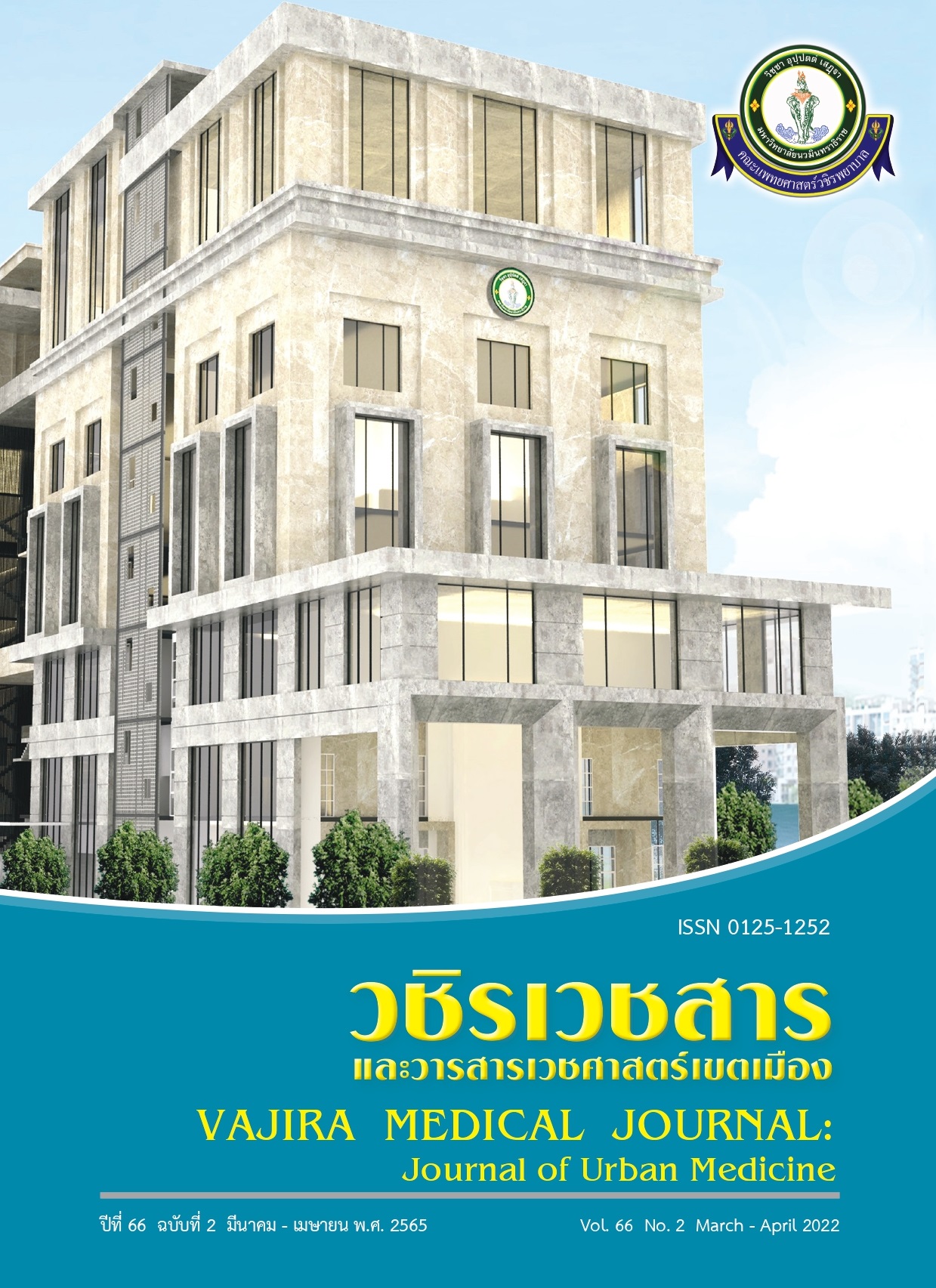Risk Factors of Blood Transfusion in Knee Arthroplasty
Main Article Content
Abstract
Background: The amount of blood transfusion after knee arthroplasty seem to vary in different reported study. We carried out a retrospective study to analysis pre-operative risk factors for blood transfusion in patient who underwent knee arthroplasty in our institution.
Methods: A retrospective study of 190 patients treated with 194 procedure (186 unilateral knee arthroplasty, 4 bilateral knee arthroplasty) from November 2014 to October 2015 was analyzed. A univariate analysis was performed to establish the relationship between all variables and the need for postoperative transfusion. Variables that were determined to have significant relationship were included in a multivariable analysis.
Results: The univariate analysis revealed a significant relationship between need for postoperative blood transfusion and preoperative hemoglobin levels, surgical technique, arthrotomy approach, DVT prophylaxis, surgical technique and surgeon experience. The multivariate analysis identified a significant relationship between need for transfusion and preoperative hemoglobin level and surgical technique. Patients with a preoperative hemoglobin less than 12 g/dL had a 5.1 times greater risk of having a transfusion than those with a hemoglobin level ≥ 12 g/dL. The surgical technique with computer assisted surgery had a 0.15 times lesser risk of having a transfusion than those with the conventional technique.
Conclusion: The preoperative hemoglobin level < 12 g/dL was shown to increase risk of the need for blood transfusion after knee arthroplasty, while computer assist surgery total knee arthroplasty was shown to decrease risk of blood transfusion. We suggested that patients with preoperative hemoglobin < 12 g/dL need to be crossmatching PRC in pre-operative steps.
Downloads
Article Details

This work is licensed under a Creative Commons Attribution-NonCommercial-NoDerivatives 4.0 International License.
References
Goodnough LT, Verbrugge D, Marcus RE. The relationship between hematocrit, blood lost, and blood transfused in total knee replacement. Implications for postoperative blood salvage and reinfusion. Am J Knee Surg 1995;8(3):83-7.
Keating EM, Meding JB, Faris PM, Ritter MA. Predictors of transfusion risk in elective knee surgery. Clin Orthop Relat Res 1998 ;357:50-9.
Larocque BJ, Gilbert K, Brien WF. A point score system for predicting the likelihood of blood transfusion after hip or knee arthroplasty. Transfusion 1997 ;37(5):463-7.
Salido JA, Marín LA, Gómez LA, Zorrilla P, Martínez C. Preoperative hemoglobin levels and the need for transfusion after prosthetic hip and knee surgery: analysis of predictive factors. J Bone Joint Surg Am 2002 ;84(2):216-20.
Moráis S, Ortega-Andreu M, Rodríguez-Merchán EC, Padilla-Eguiluz NG, Pérez-Chrzanowska H, Figueredo-Zalve R, et al. Blood transfusion after primary total knee arthroplasty can be significantly minimised through a multimodal blood-loss prevention approach. Int Orthop 2014 ;38(2):347-54.
Bierbaum BE, Callaghan JJ, Galante JO, Rubash HE, Tooms RE, Welch RB. An analysis of blood management in patients having a total hip or knee arthroplasty. J Bone Joint Surg Am 1999;81:2-10.
Dodd RY. Current risk for transfusion transmitted infections. Curr Opin Hematol 2007;14(6):671-6.
Bong MR, Patel V, Chang E, Issack PS, Hebert R, Di Cesare PE. Risks associated with blood transfusion after total knee arthroplasty. J Arthroplasty 2004;19(3):281-7.
Charoencholvanich K, Siriwattanasakul P. Tranexamic acid reduces blood loss and blood transfusion after TKA: a prospective randomized controlled trial. Clin Orthop Relat Res 2011;469(10):2874-80.
Surgenor DM, Wallace EL, Churchill WH, Hao SH, Chapman RH, Poss R. Red cell transfusions in total knee and total hip replacement surgery. Transfusion 1991;31(6):531-7.
Mesa-Ramos F, Mesa-Ramos M, MaquieiraCanosa C, Carpintero P. Predictors for blood transfusion following total knee arthroplasty: a prospective randomised study. Acta Orthop Belg 2008;74:83-9.
Walker RH. Special report: transfusion risks. Am J Clin Pathol 1987;88(3):374-8.
Pierson JL, Hannon TJ, Earles DR. A bloodconservation algorithm to reduce blood transfusions after total hip and knee arthroplasty. J Bone Joint Surg Am 2004;86(7):1512-8.
Salido JA, Marín LA, Gómez LA, Zorrilla P, Martínez C. Preoperative hemoglobin levels and the need for transfusion after prosthetic hip and knee surgery: analysis of predictive factors. J Bone Joint Surg Am 2002;84(2):216-20.
Prasad N, Padmanabhan V, Mullaji A. Blood loss in total knee arthroplasty: an analysis of risk factors. Int Orthop 2007;31:39-44.
Bong MR, Patel V, Chang E, Issack PS, Hebert R, Di Cesare PE. Risks associated with blood transfusion after total knee arthroplasty. J Arthroplasty 2004;19(3):281-7
Spahn DR. Anemia and patient blood management in hip and knee surgery: a systematic review of the literature. Anesthesiology 2010;113(2):482-95.
Tavares Cardozo R, Fidelis de Souza Junior E, Campoli Alves W, Barbi Filho F. Total knee arthroplasty: indication of blood transfusion according to hematimetric variation and clinical symptoms of hypoperfusion. Rev Bras Ortop 2014;49(5):507-12.
Conteduca F, Massai F, Iorio R, Zanzotto E, Luzon D, Ferretti A. Blood loss in computerassisted mobile bearing total knee arthroplasty. A comparison of computer-assisted surgery with a conventional technique. Int Orthop 2009;33(6):1609-13.


